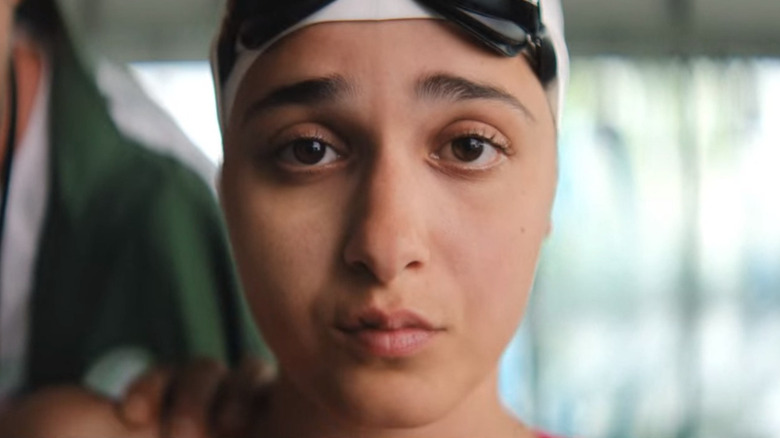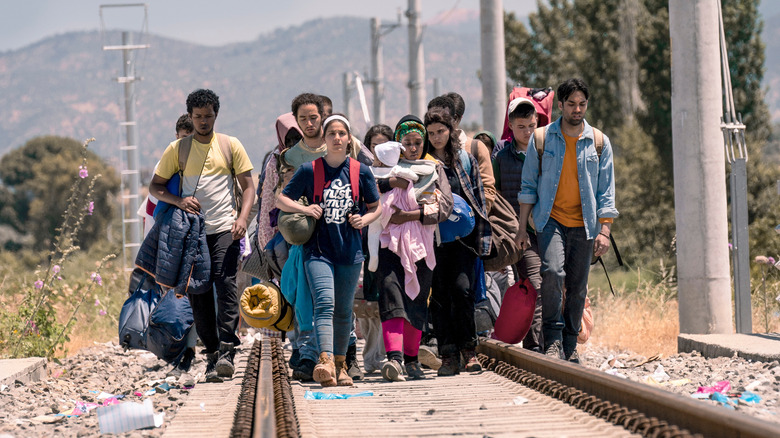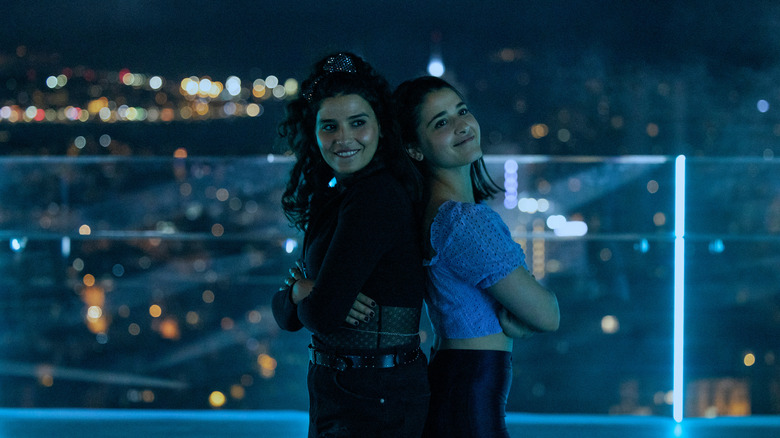The Swimmers Review: A Mixture Of Sports Underdog And Wartime Drama
- Gives visibility to an important story
- Great sisterly dynamic between lead actresses
- Sometimes contrived
When you get right down to it, swimming is all about control. Perfectly coordinated breathing patterns, all the tiny movements that shave off milliseconds, making the difference between first and second place; success and failure; survival and the other thing. "The Swimmers," directed by Sally El Hosaini, is the incredible true story of a pair of sisters who defy the odds, fleeing war-torn Syria in pursuit of safety and their dreams of Olympic gold. Although at times occasionally hamstrung by the conventions of this burgeoning subgenre, it nonetheless finds empathetic heroes amidst a moving journey that captures the relentless difficulties of life as a refugee.
For Sarah and Yusra Mardini (played by real-life sisters Manal and Nathalie Issa), swimming is everything. They've been trained by their father with one goal in mind: to compete at the Olympics for Syria. Of course, these dreams were borne before instability and open war would ravage their country, leaving it a shell of its former self. The two girls cling fast to moments of normality — a night of freedom out at a local dance club, the comforting ritual of swimming practice with their father — but the situation becomes more and more untenable. They track friends and loved ones who are here one moment and gone the next, fleeing the country or worse, killed in a bombing raid. When one of Yusra's competitions is interrupted by a stray missile, the Mardini family must face the reality that in order to ensure their survival, Sarah and Yusra must make the perilous journey to the relative safety of Europe.
A captivating story of refugee life
"The Swimmers" is occasionally frustrating — at times it is surprisingly refreshing in its approach is at times, while at others it is determinedly conventional. It deserves credit in how it goes to great lengths to depict refugees from different backgrounds, not just from Syria and the Middle East, but from throughout Africa. We see all of the different reasons that a person might have for fleeing their homeland, from war to poverty to untenable domestic situations, and the bonds that form between these people in the midst of unimaginable hardships. "The Swimmers" never shies away from the struggles faced back the refugees.
It captures the hopelessness of the refugee situation even for those who managed to make their way to the Promised Land — sharing repurposed shipping containers like dorm rooms with complete strangers and facing massive waits to get paperwork processed, without which they can't work or, more importantly for the Mardini sisters, have any hope of having the rest of their family join them in Europe. Getting there, it seems, is only half the battle. They will now have to overcome the crushing bureaucracy that has no intentions of making it easy for them to make a life for themselves. It's also realistic in how it depicts the process for ordinary people: Olympic-caliber swimmers may have doors opened for them that others would not, as we see with their intelligent and kind but otherwise unexceptional cousin who accompanies them and feels deflated by the lack of opportunity he finds in his new country.
The power of the Mardini sisters' bond
It feels important that in "The Swimmers" we see female Muslim characters who have the freedom to be athletes — a rarity in film — and the heroes of their own stories. The sisters featured in the film are an incredible find: Their chemistry together is so authentic and all the more moving for the fact that the connection between them is real. The dynamic between them provides a tremendous amount of emotional depth to the film, with Sarah's compulsive need to be strong and protect her younger sister especially powerful. "The Swimmers" is truly a remarkable story, and so much of it is based on the Mardini sisters' real experiences, which lends it a degree of authenticity. Still, there are moments that can't help but feel ever-so-slightly contrived in an effort to consolidate events into a feature-length narrative: Wait times seem abbreviated, help comes at exactly the most convenient times, and conditions in some of the camps that the Mardini sisters stay in, although far from luxury accommodations, feel somehow sanitized.
And this issue gets to the heart of what makes "The Swimmers" good, but not great. It has a lot of moving and powerful details, but as a whole the narrative rarely rises above generic melodrama, a refugee story that perplexingly feels as though it somehow lacks stakes. There's a well-constructed sequence with the sisters and their fellow travelers at sea, crossing the Mediterranean in a leaky lifeboat. We know exactly how risky this is, and how desperate they must be to commit to such an undertaking: We've seen news footage and documentaries that show how many refugees lost their lives on such a journey. But the way that it's filmed here, it never feels hopeless or claustrophobic — "The Swimmers" has instilled in us such faith in the Mardini sisters' abilities that we never doubt for a second they will be able to tow the boat to safe harbor, muting its emotional impact.
Maybe this is too harsh on the film. Maybe their story is so incredible that to see it depicted on screen was always going to feel false or contrived. But although "The Swimmers" is inspirational and heart-warming, featuring two strong performances from rising stars, it's these small moments of emotional disconnect that stop it from achieving unequivocal greatness. Still, though, it should be considered a worthwhile and important film, if only because it challenges Western expectations of what Muslim women look and act like. "The Swimmers" offers a rare cinematic depiction of them as determined, empathetic heroes, without asking them to sacrifice an ounce of their identity in the process.


